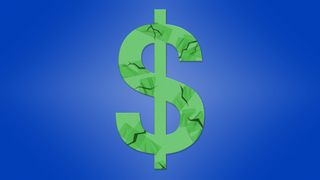Illustration: Megan Robinson/Axios
Some are warning that the Federal Reserve’s effort to sluggish inflation may doubtlessly return the U.S. economic system to the weird situation it discovered itself in in the course of the Nineteen Seventies and early Nineteen Eighties: Stagflation.
The large image: Regardless of excessive inflation, the U.S. economic system is buzzing alongside — with unemployment at 3.6% in April —close to the low ranges that final prevailed within the late Nineteen Sixties.
What’s stagflation?
Stagflation describes a extremely uncommon financial state of affairs when the economic system is weak or stagnating — with excessive or rising unemployment — but inflation can also be elevated.
- That is the alternative of what normally occurs.
- Excessive inflation tends to interrupt out when financial development is admittedly roaring.
- Durations of weak financial development, and rising joblessness, are sometimes accompanied by sluggish value will increase, and even falling costs.
Do we now have stagflation proper now?
No.
Whereas the annual tempo of value will increase have surged to 40-year highs in current months, unemployment is extremely low. That is an inflationary setting, not stagflation.


When’s the final time we had stagflation?
One of the best-known stagflationary episodes hit the U.S. within the Nineteen Seventies and early Nineteen Eighties, when a collection of oil shocks — particularly the 1973 embargo that Arab members of OPEC positioned on the USA in response for army assist of Israel — despatched gasoline prices and inflation surging, as unemployment concurrently shot larger.
The mix of vitality shocks and stagflationary situations lasted on and off into the early years of the Reagan administration. As late as 1982, unemployment was hovering round 10% and costs have been rising as a lot as 6% yearly.
So why are we speaking about stagflation?
Quite a few financial coverage bigwigs — former Federal Reserve chairman Ben Bernanke, present Fed chair Jerome Powell and Treasury secretary Janet Yellen (who additionally led the Fed) — have just lately both implicitly or explicitly advised that because the Fed tries to convey down inflation, unemployment will seemingly rise.
That may seemingly imply we’ll have an economic system that’s form of stagflationary, no less than for some time frame. In different phrases, development might be weakening, however inflation will nonetheless be excessive.
What are they saying?
- Treasury Secretary Janet Yellen on Wednesday: “The financial outlook globally is difficult, and unsure, and better meals and vitality costs are having stagflationary results, specifically, miserable output and spending and elevating inflation all all over the world.”
- Bernanke in a New York Occasions article printed this week: ”Even underneath the benign state of affairs, we must always have a slowing economic system … And inflation’s nonetheless too excessive however coming down. So there needs to be a interval within the subsequent yr or two the place development is low, unemployment is no less than up a bit bit and inflation remains to be excessive,” he predicted. ”So you could possibly name that stagflation.”
What can Biden do about stagflation if it really happens?
Not a lot that would not be politically unpalatable.
- Biden may suggest a pointy discount in federal deficit spending. That would assist cut back inflation, however it will seemingly damage development and lift unemployment.
- He may try the type of wage and value controls that President Nixon imposed in 1971, although that appears extraordinarily unlikely and never notably efficient.
- He may mainly let the Fed cope with it. That is primarily the trail Jimmy Carter took within the late Nineteen Seventies. The hovering Fed price hikes and the deep recession that adopted contributed mightily to his annihilation within the 1980 presidential election.
The underside line: Like we mentioned above, we do not but have stagflation. It is potential that the Fed is ready to thread the needle so completely that inflation comes down simply and unemployment raises ever so barely and no person notices.
- However stagflation is a chance, and an unappealing one for virtually everybody.
